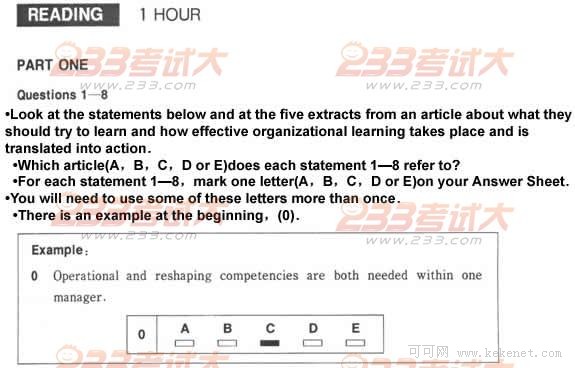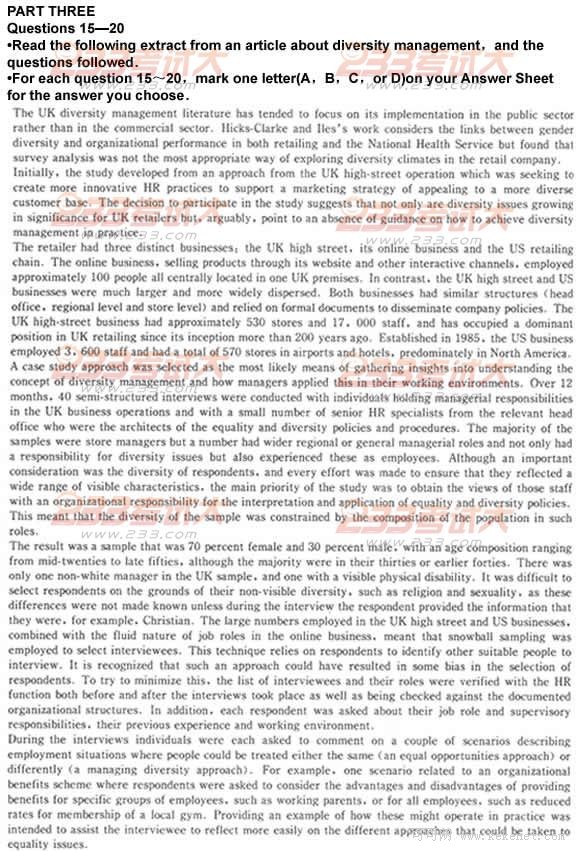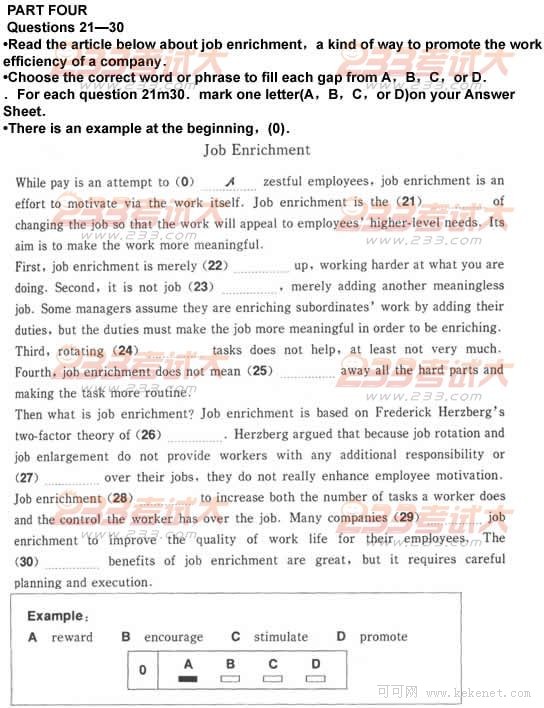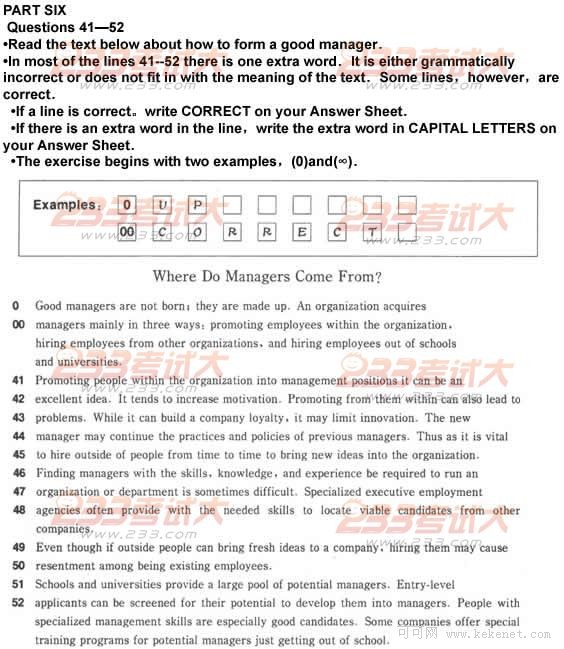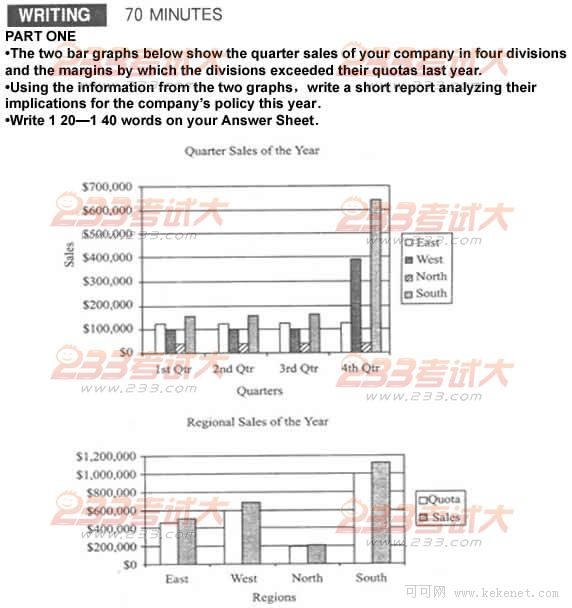(单词翻译:单击)
1 The development of individual managers must itself become a corporate competence.
2 Courses can make an important contribution but need to be combined with apprenticeship,experiential learning and mentoring.
3 That a firm succeeds or not depends on what it chooses to do rather than the environment it operates.
4 Reshaping competencies adds little to immediate business results.
5 A firm performs well if it develops a “distinctive competence” over time.
6 A company needs to give its managers as many opportunities as possible to access other tasks.
7Reshaping competencies may not bring great benefit to the corporation immediately.
8 Managers do not need identical sets of competencies.
A
The learning organization is one where the organization is developing the core competencies that will give it competitive advantage in the marketplace.These core competencies are of two kinds:technical competencies which provide the key to the organization’s market position;and management competencies which are vital to its performance as an integrated organization.
B
The key aspects of individual management development,such as recruitment,trainin9,career development,job rotation,special assignments,meaningful work,relevant reward systems,need to be embedded in organizational systems,structures,values and policies and consistently applied in practice.In a learning organization,management development is not an on again,off again activity.
C
An organization full of change effective managers only,or of operational managers only,is likely to be headed towards bankruptcy.A balance is needed between operational and reshaping competencies.Part of that balance needs to be found within individuals,part of it in the respective strengths of individuals,and parts within the embedded processes and resources of the organization.This has important implications for the placing of managers in jobs and also for moving them when their key skills are no longer so relevant and the managerial needs of their positions change.It also has implications for the composition of top teams.Unless the top team includes some powerful members who are committed to long-term performance,the organization is unlikely in the longer term to build those reshaping competencies that will ensure its own renewal that is,to become a learning organization.
D
Forward.100king organizations are increasingly identifying potential change leaders early in their careers,giving them responsibilities for smaller change projects and the opportunity to work closely with effective change practitioners SO that they can develop the range of reshaping competencies that the firms increasingly need. some firms are also taking some of their most effective managers off-line and giving them project responsibilities that encourage them to augment their existing high levels of operational competencies with reshaping competencies.Ensuring that many managers at critical stages of their careers have the experience Of managing transitions is vital to developing a managerial mindset that balances the relative importance of maintaining effective ongoing operations with transforming them.It is this mindset that supports the need for current performance with the openness to change that underlies a learning organization.
E
In some cases,reshaping competencies may detract from immediate business results.Reshaping competencies requires considerable investment of resources,effort and time sometimes for little or no immediate benefit.Their expected benefits are often difficult to quantify or measure and the results only show up overtime.Furthermore,continual investment is needed to maintain them.The benefits of creating learning organizations do not come free.They also do not come unmanaged.To be effective in meeting the organization’s purposes,organizational learning needs to be a managed process and organizational learning a key responsibility of top management.The creation and use of reshaping competencies’ both personal and corporate,is the key characteristic of the learning organization.
A Other natural problems such as lightnin9,frost,drought,too much rain,etc.,will tend to be the major reason for the fluctuation in product quality and price because of availability.
B All producers of whether it be a physical object or service have some basic elements in common.
C For example,all managers in any organization will need to know how to train their employees,appraise their performance,and SO forth.
D The end product then becomes an idea where it is deemed a useful idea due to the form,the time,or the place of their availability from the conversion process
E For example,such fluctuations in the product quality or price may be due to the growing weather conditions of many plants of fruit and vegetables
F Once a product is made available to the consumer,that product is sold and converted into cash for that company and the cycle continues.
G The general goal for all production is to create some kind of value added,so the outputs are worth more to the consumer than just the sum of the individual inputs
H In some situations the product will outweigh the service but in other situations it will be the opposite.
15 From the first two paragraphs,what can you predict about the main purpose of the study?
A The study is to expose the thought of a number of managers who were responsible for the application of organizational equality and diversity policies in the retailing industry.
B The study is mainly about in the implementation of organizational diversity initiatives,employers need to take greater account of the tensions facing line managers.
C Line managers regard a diversity management agenda concerned with recognizing and responding to individual differences.
D The study is to explore through qualitative methods the understandings.perceptions of fair treatment and reported actions of a group of managers.
16 What was the research primarily based on?
A In-depth interviews conducted with managers,HR specialists and employees across the three distinct business units.
B A long—established UK major high.street retailer of stationery and books.
C UK diversity management literature and the UK high.street operation.
D UK retailers.
17 What is the similarity among the retailer’s three distinct businesses?
A They all occupy a dominant position in UK retailing.
B They all possess a large number of consumers and a wide as well as prosperous market.
C They all have very different operational contexts.and they all sell products relating to entertainment,information and education.
D They all sell products through the website and other interactive channels.
18 To minimize the bias in the selection of respondents.why was each respondent asked about their job role and supervisory responsibilities,their previous experience and working environment?
A To have a better understanding about the value and world view of the managers.
B To explore the managers’ perceptions of equality and diversity policies.
C To test the sensitivity of perception and discrimination of the respondents.
D To get to know the manager’s criteria on working.
19 In the last paragraph.what is the aim of the assumed scenarios put forward by the interviewer on those interviewees?
A These scenarios were designed to illustrate that the situation in the online business was far more fluid.
B These scenarios were designed not only to identify what they would do in particular circumstances but also to describe critical incidents that illustrated their own approach to managing diversity.
C These scenarios were designed to be a supplement to the interviews.and each attempted to illustrate the essence of managing diversity and the equal opportunity approach as described in the literature.
D These scenarios were designed to clarify the extent of managerial responsibilities for diversity management within the different operations.
20 What does this article mainly concern?
A The article suggests that it is a concept that lacks clarity for line managers in terms of how it should be implemented within the anti-discrimination legal frame work.
B This article is mainly about present particular dilemmas for line management in terms of how to respond to individual differences.
C This article examines how operational managers are interpreting the management of diversity in practice.
D This article concerns that employers need to take greater account of the tensions facing line managers.
21 A purpose B program C project D process
22 A speeding B enhancing C promoting D speaking
23 A enrichment B enrollment C enlargement D enactment
24 A lexical B meaningless C leisureful D meaningful
25 A cancelling B taking C abolishing D getting
26 A aim B purpose C motion D motivation
27 A command B dominate C control D rule
28 A purports B claims C profess D represent
29 A make B use C put forward D apply
30 A potential B useful C meaningful D possible
PART TWO
Questions 2—4
Write an answer to one of the questions 2—4 in this part.
Write 200--250 words on the separate answer paper provided
Question 2
Your company has decided to look into how establishing cooperation between a school and itself will affect its productivity.You have been asked to write a proposal regarding the consequences of various types of cooperation such as“ adopt—a-school” programs.
Write your proposal,including the following:
a description of the current relations between educational institutions you’re your company
recommendations for types of cooperation between a school and your company an explanation of the benefits from the cooperation
suggestions as to how the employees should be motivated
Question 3
A restaurant has recently moved to a new location,and the owner of this restaurant has asked you to write a report of problems that occurred due to this transition.
Write the report to your manager,including the following information:
the need to research the problem created after the transition specific problems that occurred solutions demanded under this circumstance
Question 4
Your company has just received a letter from a purchasing agent,who claims that the last shipment from your company was damaged and wants a replacement shipment.You have been asked to write a letter as a reply to his request.
Write the letter to the purchasing agent:
apologizing for the damage and explaining possible causes asking for detailed documents about the damage
expressing your goodwill to cooperate in the future
Speaking 16 MINUTESPART TWO
Task Sheet for Candidate A
Task Sheet l
A:Business communication:the importance of communication in business
B:Customer relations:how to set up an effective customer services system
C:Advertising:how to advertise a new product effectively
Task Sheet for Candidate B
Task Sheet 2
A:Recruitment:how to ensure that job advertisements attract appropriate applicants
B:Staff management:the importance of assessing staff performance effectively
C:Career planning:the possible steps in career planning
PART THREE
Your company is planning to open an employee fitness centre.You have been asked to submit ideas on it.Discuss and decide together
·what facilities the fitness centre should provide for the employees
·the opening and closing time of the centre
READING
Part One
1. B 2. D 3. A 4. E 5. A 6. D7. E 8. C
Part Two
9. B 10. F 11. G 12. D 13. E 14. A
Part Three
15. D 16, A 17. C 18. B 19. C 20. C
Part Four
21. D 22. A 23. C 24. B 25. B 26. D27. C 28. A 29. B 30. A
Part Five
31. FEW 32. THIS/IT 33. NO
34. THAT/WHICH 35. WITHOUT 36. THEM37. WITH 38. ACROSS 39. ANY
40. THEIR
Part Six
41. IT 42. THEM 43. A 44. AS
45. OF 46. BE 47. CORRECT 48. WITH
49. IF 50. BEING 51. CORRECT 52.
WRITING
Sample answer to question 1:
Quarter-to-quarter sales increased throughout the year in every division. However, sales increase in the East and North are relatively modest, never over 10% percent in each quarter. By contrast, fourth quarter sales in the West and South jumped dramatically by over 200 percent.
All four divisions exceeded Their quotas, although the percentages of their excesses vary from one another. Again, sales in the West and South exceeded their quota by greater percentages than in the North and East.
In conclusion, it appears that we could probably establish next year's quotas at a level slightly above this year's sales. The increases of sales in the South and West seem to justify our decision to expand operations in both areas. While opportunities are more limited in the East and North, it may be cost-effective to try a limited expansion there.
Sample answer to question 3:
The Whistling Abalone has recently moved to a new location in Monterey, California. The transition to a larger space, with doubled seating capacity, has already revealed problems in the current pattern of operations and will undoubtedly create further problems when we move into full capacity this summer. John Bossacco, owner of the restaurant, asked me to identify these problems and to recommend a solution.
The increased volume of food and liquor has resulted in poor inventory control. Moreover, the large size of the restaurant has impaired waiter service and floor operations in general. Another problem is the added amount of bookkeeping that has come with expanded operations. These problems must be resolved before the vacation season begins in May. The purpose of our move is to expand our business and to improve our already good reputation. Problems like those mentioned will undoubtedly hurt our reputation if not corrected immediately.
I recommend the use of a management information system (MIS) at The Whistling Abalone to correct our problems. A simple system can solve all those problems mentioned and provide other useful features for our bright future. This system should have the following capacities:
1. Keeping accurate and updated inventory records.
2. Providing automatic ordering of both drinks and dinner items.
3. Providing record- keeping and accounting functions to facilitate book keeping.
SPEAKING(Interview)
Part One
Interviewer (F): Good afternoon. I'm Liu Li. And this is my colleague Wang Lin. She's just going to listen to us. And your names are?
Xie Hui (M) : My name's Xie Hui.
Tao Sha (F) : And my name's Tao Sha.
Interviewer: Could I have your mark sheets, please?
Xie Hui: Sure.
Tao Sha: Here you are.
Interviewer: OK. Xie Hui, do you work or are you a student?
Xie Hui: I'm a college student. My major is business management.
Interviewer: Tao Sha, what about you?
Tao Sha: Oh, I'm college student, too. And my major is international studies.
Interviewer: Tao Sha, do you like your major?
Tao Sha: Yes, very much. You know, international studies involve a lot Of things, like International law, international economics, international history and politics, etc. I like them all. Of course, English is also very important to us because it's one of the most important international languages. And myd ream is to become an ambassador or some thing like that some day.
Interviewer: Xie Hui, what about you?
Xie Hui: Yeah, I like my major very much. It's the major of my choice. I've always been interested in management, especially business management. I'm also very interested in English. A combination of business management and English could give me a very good edge in the job market. Now, I'd like to think of myself as a very possible candidate for the CEO position at a very big and dynamic firm home or abroad.
Interviewer: How important do you think it is for business people to have enough leisure time?
Tao Sha: I think it is very important. Leisure time is time for them to have a rest, to relax, to entertain. This could help relieve the pressure they get from work, so that they would be more energetic for work. In my opinion, those businessmen who have little leisure time are often less efficient in their work performance than those who have enough leisure time.
Xie Hui: I totally agree with Tao sha on that. Having enough leisure time could ensure better performance at work. It can also allow businessmen an opportunity to get to know things other than business, even get to know some very interesting and funny people. This would result in their own good humor and make them fun to work with.
Interviewer: OK. Thank you.
Part Two
Interviewer: Now, I will give each of you three topics. You will have to choose one from them, prepare for it in one minute and talk about it for one minute. OK? Here are your topics. You can make notes if you wish.
(One minute later)
All right. Xie Hui, which topic have you chosen?
Xie Hui: I've chosen A. Business communication
Interviewer: OK. You have one minute to talk. Tao Sha and I will listen to you. Tao Sha, after Xie Hui's talk, you have to ask him a question. Now, Xie Hui, you may start. I'll stop you at the end of one minute.
Xie Hui: Business communication is indeed very important to a company. It's a quality is sue. The quality of the entire organization is reflected in the quality of its communications. It's also an issue of function. Communication is an essential function, just as sales are essential. Communication makes sales possible. People must communicate to plan products, coordinate manufacturing and delivery, persuade customers to buy, and bill them for the sale. Indeed, for many businesses, the "product" is information or service rather than something tangible. And information and services are created and delivered by communication. In every organization, communication is the way people get their points across and get work done.
Interviewer: Thank you. Now, Tao Sha, what is the question you'd like to ask Xie Hui?
Tao Sha: Xie Hui, what forms does business communication normally take?
Xie Hui: Well, there' s face-to-face communication, or phone conversations, informal meetings, e-mail messages, letters, memos, and re-ports, which are called verbal communication. There's also non-verbal communication like pictures, computer graphics, and company logos.
Interviewer: OK. Now, Tao Sha, it's your turn. Which topic have you chosen, please?
Tao Sha: I've chosen C. Career planning.
Interviewer: OK. You have one minute to talk. Xie Hui and I will listen to you. Xie Hui, afterTao Sha's talk, you have to ask her a question.Now, Tao Sha, you may start. I'll stop you atthe end of one minute.
Tao Sha: I think there're generally four steps in career planning. First, you have to gather information about yourself to assist in making a decision about a career. You should develop an under standing of self including values, interests, aptitudes, abilities, personal traits, and desired life style. Second, you should investigate the world of work in greater depth, narrow a general occupational direction into a specific one through an informed decision making process. Third, you should evaluate occupational choices and gain practical experience through internships, cooperative education, relevant summer employment, volunteer work and campus activities. At last, you should prepare for and begin conducting a job search, apply to graduate or professional schools.
Interviewer: Thank you. Now, Xie Hui, what is the question you'd like to ask Tao Sha?
Xie Hui: Do you think career planning is important?
Tao Sha: Yes. You know, people might, by luck or chance, find a good job without much planning, but a careful planning generally gives you an advantage over your potential rivals in a job hunt.
Interviewer: Thank you. Part Three
Interviewer:Well, Xie Hui and Tao Sha, the last part of this speaking test is a discussion task. Your discussion topic is on this task card. You have about 30 seconds to read it carefully. After you have read the task, you will have a discussion on the given topic. Your discussion time is around three minutes. OK? Now read your task card.
(30 seconds later)
Well, can you start your discussion now? I'm going to listen to you. and then ask you to stop at the end of three minutes.
Tao Sha: I think the centre should provide on site aerobics classes.
Xie Hui: Yeah, I agree. There should also be a swimming pool there, and also weight machines. Tao Sha: Yeah. And there should be at least one qualified instructor on duty at all times.
Xie Hui: Definitely. And as a fitness centre, there must be locker rooms and showers, I think.
Tao Sha: Sure. I almost forgot that. I also think that not only employees, but also clients, spouses, and children should be allowed to use the facilities. What do you think?
Xie Hui: I think that would be nice. But since it's called an employee fitness centre, employees should get first preference, and clients, spouses and children could only get to use the facilities when there is extra room.
Tao Sha: Good. And what about the opening time for the centre?
Xie Hui: Well, I think, it could open at 9:00 AM since that's when work starts, and close at 5..00since that's when people go off work.
Tao Sha: I can't quite agree with you on that. You see, if the centre is open from 9..00 to 5:00,how could anybody get the time to go there?
Xie Hui: Oh, sorry. I forgot about that. so …
Tao Sha.. I think it should open at least a couple of hours before work starts and close a couple of hours after work stops.
Xie Hui.. Yes, that's great. How does 6 AM to 10PM sound?
Tao Sha: That's perfect.
Interviewer: Do you think it's necessary for a company to open a fitness centre for its employees?
Tao Sha: Of course, most working people are busy working, so that they have very limited time to work out. Even if they do have the time, they would have to spend much of it on the way to a fitness centre. If the centre is right there in the work place, it could save them a lot of time and energy.
Xie Hui: I think a fitness centre in the work place could help those out-of-shape employees get the exercise they need to be more productive at work.
Interviewer: Thank you, Xie Hui and Tao Sha. That is the end of the speaking test.

